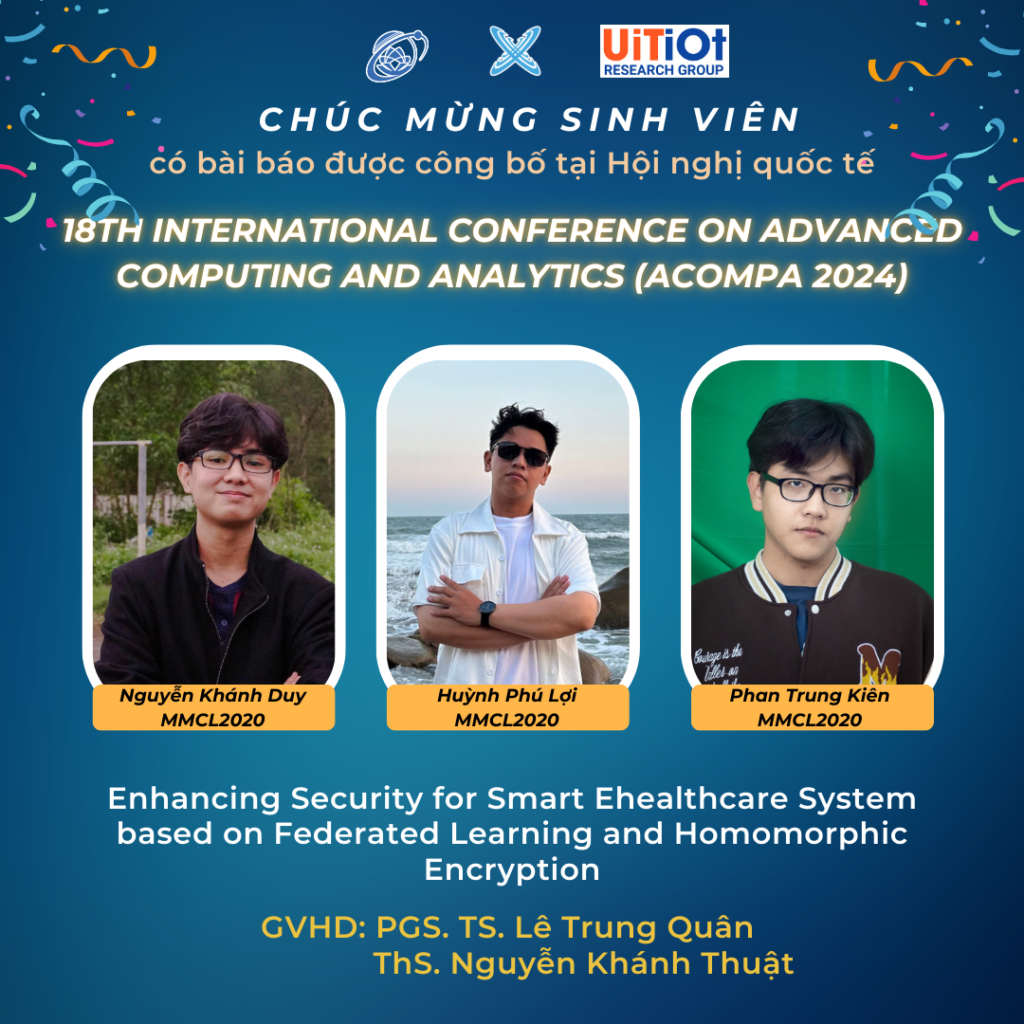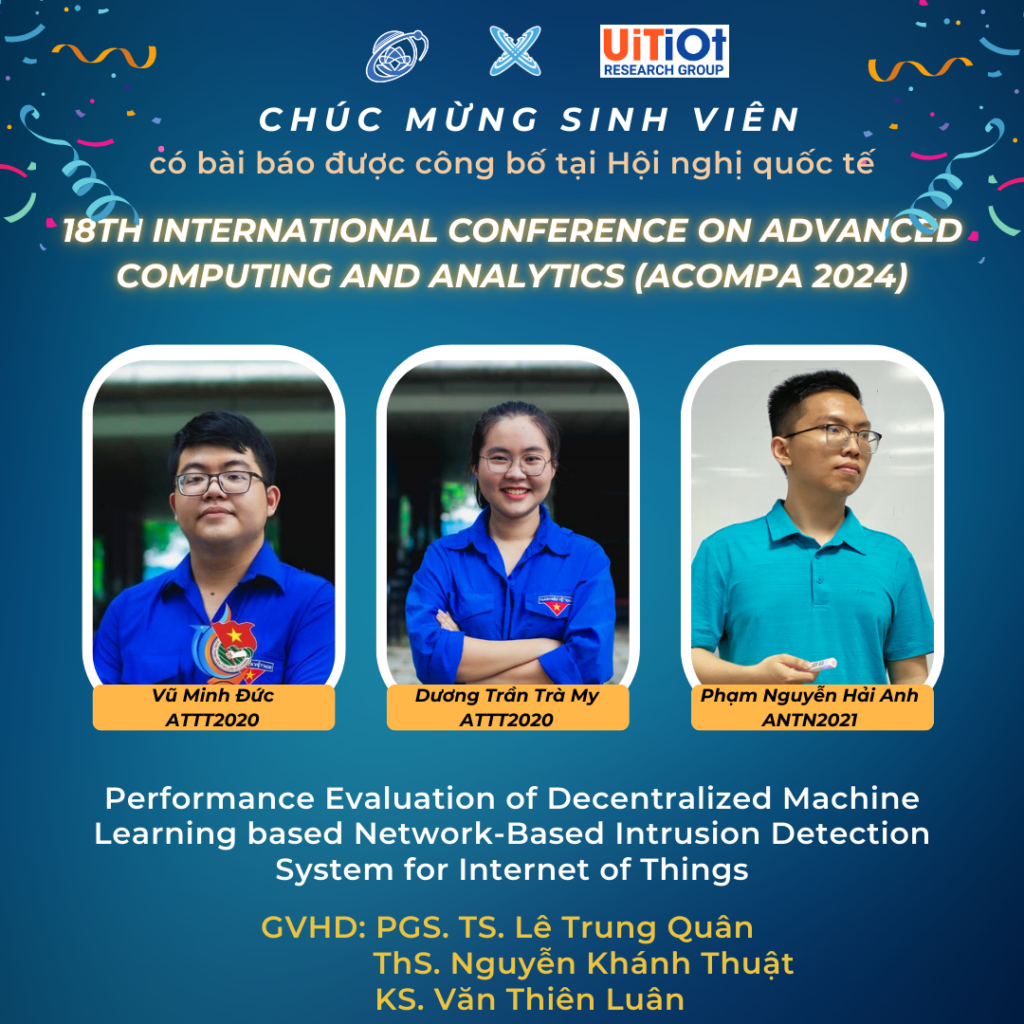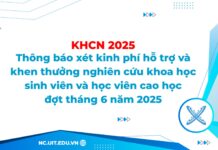Chúc mừng sinh viên Nhóm nghiên cứu UiTiOt đã có 02 bài báo khoa học được chấp nhận tại Hội nghị ACOMPA 2024 được tổ chức vào 27-29/10/2024 tại Trường Đại học Việt Đức, Tp. Bến Cát, Tỉnh Bình Dương.
Bài báo 1: Enhancing Security for Smart Ehealthcare System based on Federated Learning and Homomorphic Encryption
– Sinh viên thực hiện:
+ Nguyễn Khánh Duy – MMCL 2020 – Tác giả chính
+ Huỳnh Phú Lợi – MMCL 2020 – Đồng tác giả
+ Phan Trung Kiên – MMCL 2020 – Đồng tác giả
– Giảng viên hướng dẫn: PGS. TS. Lê Trung Quân và ThS. Nguyễn Khánh Thuật

Tóm tắt: Medical records are one of the most sensitive types of data, so when applying machine learning models, it is necessary to ensure data privacy. In recent years, machine learning and pre-trained models have been developing rapidly, and medical data security when using those models is gaining strong appeal with researchers. This study proposes a federated learning model integrated with homomorphic encryption to enhance security and privacy while training machine learning models on medical datasets. Additionally, we conducted experiments with federated learning models using different data distribution ratios to evaluate the robustness of this approach. The results show that the CNN, ResNet50, ResNet152, and DenseNet169 models integrated with federated learning on the LIDC-IDRI dataset have comparable accuracy to centralized machine learning. Moreover, the federated learning model integrated with Homomorphic Encryption on the ResNet50 model showed a 4% increase in training time and a 36% increase in model size compared to federated learning without encryption.
Bài báo 2: Performance Evaluation of Decentralized Machine Learning based Network-Based Intrusion Detection System for Internet of Things
– Sinh viên thực hiện:
+ Vũ Minh Đức – ATTT 2020 – Tác giả chính
+ Dương Trần Trà My – ATTT 2020 – Đồng tác giả
+ Phạm Nguyễn Hải Anh – ANTN 2021 – Đồng tác giả
– Giảng viên hướng dẫn: PGS. TS. Lê Trung Quân, ThS. Nguyễn Khánh Thuật và KS. Văn Thiên Luân

Tóm tắt: In recent years, IoT applications have become increasingly popular. Smart services have been deployed from the IoT infrastructure to provide convenience for humans in their lives and related activities. Alongside IoT’s potential, security and privacy concerns have been highlighted in the IoT architecture. One weakness of the IoT system is the widespread deployment of sensor nodes with wireless connections. Additionally, the limited resources of these sensor nodes pose a challenge in designing and implementing security solutions for the IoT infrastructure. In this article, we plan to deploy a Network Intrusion Detection System (NIDS) for IoT infrastructure. This system is towards to runs on the Swarm Learning framework, which supports decentralized machine learning models to ensure data distribution during training. This framework also operates on Ethereum – an open-source blockchain platform – to ensure authenticity and security while training decentralized machine learning models. We experiment with various scenarios using the DNN model via the CiCIoT2023 dataset and the CiCIoMT24 dataset. The results demonstrate that our proposed system ensures accuracy comparable to centralized machine learning and Federated Learning models. In addition, we also tested and evaluated based on training time and resource usage, thereby concluding that the cost and effectiveness of the Swarm Learning system is better than Federated Learning.
Homepage Hội nghị: https://acompa.live/
Thông tin Hội nghị:
The International Conference on Advanced COMPuting and Analytics (ACOMPA) is an annual international forum for academics, engineers, practitioners and research students to exchange concepts, techniques, methods, and state-of-the-art applications for advanced computing & analytics. Initially formed as a scientific venue for high-performance computing & advanced applications, the conference kept expanding and had the pedigree of attracting international and Vietnamese participants who are all interested in advanced topics of computer science & engineering. The first occurrence of ACOMPA dates back to as early as 2007.
Advanced computing was the main themes of ACOMPA for more than dozen years, making it a popular scientific event for high performance, scientific computing and system design in the region. Overtime, the conference’s body has evolved into a refreshingly expanded community of scholars, research students and practitioners whose interests include not only computing systems but also advanced analytics and its emerging enablers (data science, deep learning, process automation, etc.). On one hand, there has been growing attention in harvesting advanced computing systems in use today to make advanced analytics technically possible. On the other hand, with the rise of machine learning and data science, we expect to revisit our research questions and practical problems lingering in advanced computing that might have been inadequately addressed. In the year 2022, we acknowledged such a transitional change and began to use ACOMPA as our conference abbreviation





